02:45

Car sales slumped, factories closed, car retailers shut – the massive global effects of the coronavirus pandemic have had a huge impact on the car industry.
GlobalData analysis shows leading automotive companies lost a combined $564 billion in their market capitalization in the first quarter of 2020 as the FTSE 350 Automobiles index tanked by 56.8 percent in the same period.
The automotive sector was already struggling with a decline in demand for new vehicles across the world and the shift towards more environmentally friendly cars.
"Last year, I was describing what I thought was the perfect storm in terms of technological change, environmental challenges, trade tensions going on. On reflection, that was relatively easy compared to the tsunami that we have seen now. We are under pressure but essentially the industry is very resilient, very agile, very adaptable," said Mike Hawes, CEO of the SMMT, the UK's largest automotive trade body.
Now, after weeks in lockdown, the first factories starting up again are likely those supplying markets abroad. Because, while COVID-19 hammered UK car manufacturing and demand, sales in China are recovering.
"What has been going on in the past 20 years in China and the Chinese Automotive sector has been fascinating," said Hawes.
"You have seen the development of a number of brands that have been international, you have seen domestic demand very strong. It has tapered off a bit more recently, but they have been quick to shift into electrified vehicles, battery-powered electrics, plug-in hybrids. Globally, the market has to go in that direction," he said.
01:51

Bentley Motors has restarted production lines with a fundamental revamp of the way it does things, in line with social distancing and safeguarding protocols.
"We took the decision to close for seven weeks because we needed to protect our teams and their families. But we went into this pandemic with a strong order bank and what we don't want to do is keep customers waiting any longer for their cars," said Chris Craft, a member of the board for sales and marketing at Bentley Motors.
"As far as global demand is concerned, of course China is the one that came out of this first, and today China would represent about 20 percent of our global sales, so it is very, very significant. The Bentley brand fits well with our Chinese customers," he said.
The automotive sector already had some loose wheels – Technological change, green challenges, a shift in ideas about mobility. And in the UK, Brexit.
Big potential
The SMMT says four out of five cars made in Britain are exported, with half going to the EU, so striking a deal with Brussels is key for the car industry here. But as Britain’s third largest car export destination after the EU and the U.S., China is an important market with big potential.
That's why many UK car manufacturers have set up shop in China, too.
"China is the biggest car market in the world and one of the biggest markets for premium and luxury brands in the UK – Rolls-Royce, Bentley, Jaguar Land Rover – this is a hugely important market for them, said David Bailey, a professor at Birmingham Business School.
"Jaguar Land Rover might only have 20 percent cars sold in China, but that is 50 percent of their profit. So the UK and China are really interlinked in the auto industry," he said.
The SMMT says how quickly partnerships can develop and new projects can be started depends on everyone taking an international, collaborative approach.
"China, with its innovation, its technology, might look to take advantage of what the UK has to offer – very strong academic base, good relationships between universities and industry, a lot of innovation, a lot of spin-off companies in some very niche areas around power control, electronics and that shift towards autonomous vehicles," said Hawes.
While Britain has that engineering and academic expertise, China is an important manufacturing hub, sales market and funder.
The London Electric Vehicle Company – which makes London's black cabs – is owned by China's Geely Group. Volvo Cars, Lotus and Proton are also in Geely's portfolio.
And going electric could mean more opportunities for China in the UK.
"Big investment has gone into various European countries in battery manufacturing on a really big scale, in Germany, Finland and France. The UK is lagging behind and really needs to attract a big battery manufacturer. Several of those are Chinese, so there is a potential deal to be done there," said Bailey.
It is a bumpy road ahead post pandemic – and post-Brexit – but as they lead innovation and help build investment, the UK and China's automotive relationship is gearing up for growth.